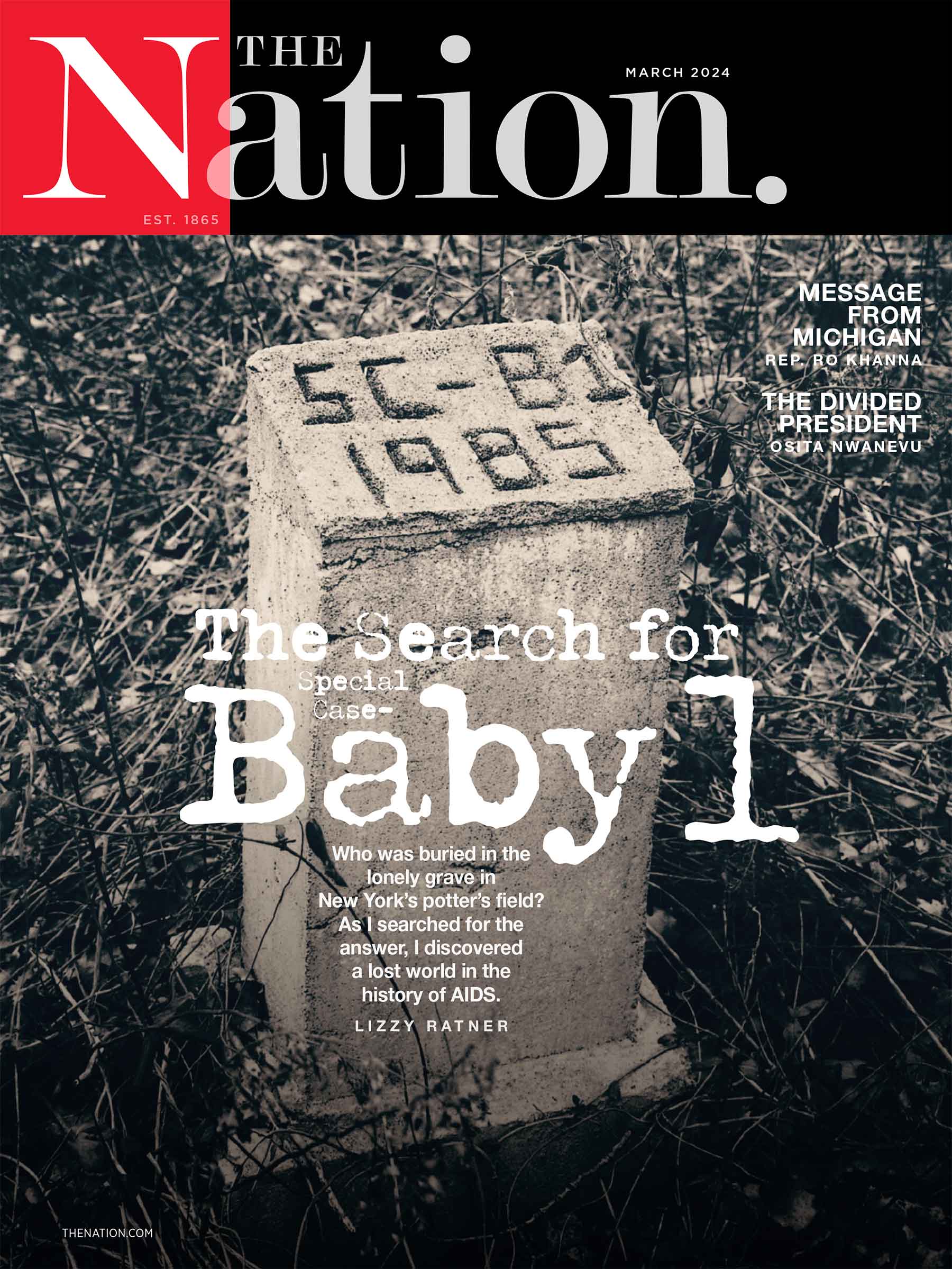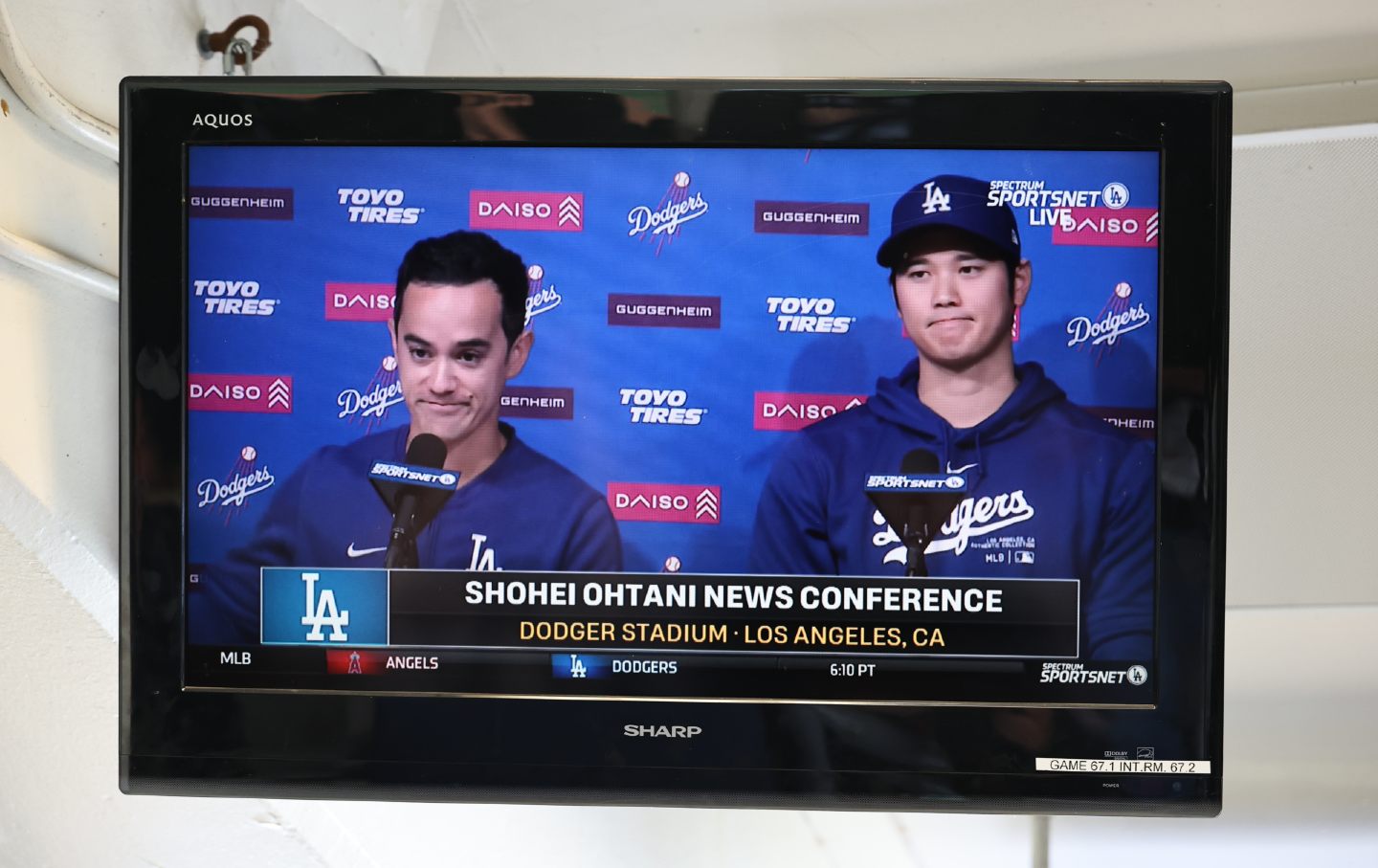
It has already been a dire year for the industry, but the shoots of a thriving media ecosystem are here.
A new journalist- and community-run media ecosystem is emerging.
(Halfpoint Images / Getty)
One night during his freshman year of high school, the writer and editor Osita Nwanevu watched an episode of Cold Case that featured some exciting music—music that “sounded radically different” from anything he’d listened to before. He wanted to hear more.
The library had Nevermind on CD; the next time I went, I checked it out. To date, it’s the most personally consequential item I’ve ever borrowed from a library. It fundamentally rewired me. No book touches it.
I took it to school in my CD player every day. I checked out a [Kurt] Cobain biography and read it three times. I checked out Cobain’s journals and hunted for information about the bands he mentioned. That led me to a website called Pitchfork. I discovered they’d published a book the library had—The Pitchfork 500: Our Guide to the Greatest Songs from Punk to the Present. I checked that out too and listened to every track I could find on YouTube.
This essay—which goes on to clobber Matt Yglesias for his poor understanding of punk rock—skims elegantly between libraries, music, education, and punditry. Nwanevu’s defense of punk’s fidelity of purpose, its independence, and its DIY ethos, combines scholarly, meticulously careful rhetoric with a sense of irrepressible fun. It appeared recently in Flaming Hydra, the cooperative I helped found this year with 50-some fellow writers and artists; we publish a daily newsletter offering rich and fiery journalism, essays, fiction, art, and criticism. On any given day you might have read Anna Merlan on her brush with the NXIVM cult; or Gabriel Snyder, whose belt buckle appeared at the center of a story about Brooklyn’s part in the Civil War; or Jonathan M. Katz on the aftermath of his viral TikTok, in which he exposed the mendacity of Alabama’s US Senator Katie Britt.
Current Issue

Flaming Hydra is just one of many promising journalist-run projects that have sprung up in recent years to keep independent, reader-focused media alive and thriving.
Dozens of publications have crashed over the last decade, leaving tens of thousands of journalists out of work: So far this year, Vice, Business Insider, The Messenger, the Los Angeles Times, Sports Illustrated, Pitchfork, and BuzzFeed have announced mass layoffs or closures. Since 2020, more than 50,000 media jobs have vanished.
Media professionals have found themselves obliged to play a version of musical chairs in which the chairs keep bursting into flames or plunging through trapdoors, leaving only a few splintery stools around for those lucky enough to grab one. Little wonder that a lot of journalists, writers, and editors are choosing to build alternatives—and not only because we know that the avaricious and ignorant practices of the “investor class” are responsible for this mess but because we know that we’re the ones making the product readers are buying. The foundational transaction is so simple, when you take the MBA-speak out of the equation. People want to know what the hell is going on, and we want to find out and tell them.
Despite what executives may think at OpenAI or anywhere else in Silicon Valley, no machine can produce the inventiveness, the wit, or the pleasure of connection provided by writing and art made by talented people. No machine can produce that kind of delight or surprise. They will never get within a mile of Tom Scocca writing on the nature of goblins or Carrie Frye on Shirley Jackson’s imaginary tiara. Only real people can do that.
Flaming Hydra, 404 Media, Aftermath, and Hell Gate are worker-owned cooperatives, and so is Defector, which celebrated its third birthday last fall. Other journalist-run publications are nonprofits, like Documented, the Colorado Sun, and Block Club Chicago. Some of these projects rebuilt over the foundations of badly managed or shuttered publications, and others started from scratch; some have achieved profitability, and others are just starting to build it. What they have in common is that the primary goal is doing real journalism. These publishers want to find and keep intelligent, engaged readers—and that means that serving those readers well, and sustainably, comes before maximizing profits.
In his introductory post at Defector, Tom Ley made the case for this approach, denouncing the private-equity goons who “go on cashing their checks while simultaneously slashing payroll.” Defector’s goal, he said, is “to create a financially stable and independent publication that exists for reasons beyond squeezing out profits for some people in a boardroom, or fattening itself up for an acquisition.” Three years in, it’s clear that Ley’s aim has been realized: Defector’s most recent annual report announced that the company continues to have no outside investors and no intention of raising outside capital, and reported a profit of $100,000 on revenues of $4.5 million.
Block Club Chicago, a nonprofit newsroom, was founded on the same principles in 2018 by veteran reporters Shamus Toomey, Jen Sabella, and Stephanie Lulay, after mass layoffs at DNAinfo. In six years, Block Club has grown from five to 35 full-time employees, and now has more than 20,000 paying subscribers.
“It’s sad that decades of incompetence and malfeasance of business types ruined so many newsrooms that were pillars of their communities,” Lulay told me via e-mail. “But it’s led to an incredible moment for journalism…one where we realized: Journalists and communities should own the news. Not hedge funds and billionaires.”
With representatives of the money-first approach setting the terms of the conversation, it’s no wonder that the disastrous consequences of their mismanagement remain so poorly understood. How is the loss of tens of thousands of working writers, editors, and artists damaging the quality of culture in the US? It’s impossible to quantify, but it’s not hard to see that the loss of so many alt-weeklies, of so many great old newspapers—to say nothing of Vice or Gawker or Pitchfork or Bandcamp or BuzzFeed News—has left us with a drearier, less imaginative, less interesting culture. Slowly, though, that free-thinking, inclusive energy is resurfacing in journalist-run media.
The reason these new publications haven’t grown faster, despite their high quality, is that they are not free to read, and there’s a good reason for that. Again and again we’ve seen that money from advertisers, owners, and/or investors comes with strings that will inevitably, sooner or later, be pulled. The only real way to prevent that is to make sure that nobody except readers is ever allowed to pay the bills. For now, the safest path to sustainability in publishing is through subscriptions. (Remembering the fates of those who risked their careers on richly funded startups like The Messenger, The Correspondent, BuzzFeed, DNAinfo, etc., only reinforces that conviction.)
Popular
“swipe left below to view more authors”Swipe →
Over the years, investor-controlled media companies have conditioned people to believe that they’re entitled to free media, particularly online. This is baffling! You shouldn’t expect high-quality media to be free, any more than you’d walk into a supermarket expecting free oranges or a movie theater expecting a free ticket. If you’re relying on free media for your information, though, ask the question: Why is this free? Who benefits from my reading this? In other words, who is controlling what you are reading, and why? Might they have business interests that need protecting? Are they vilifying or attempting to discredit their critics? Are they praising or promoting the interests of their friends or political allies?
Those who’ve watched Twitter devolve into a giant fatberg of crypto scams and hate can tell you that corporate owners really can and really will control what you see. Who pays for the writing determines the tenor of what you read, the flavor of it. Free media may be free, but a lot of it is free poison.
All this is by way of saying that people more interested in profits than publications have no business running the cultural institutions that are meant to inform and connect a whole society. Like Lulay says: Journalists and communities should own their own media. There can be a symbiotic, mutually beneficial relationship between readers and the writers, editors, and artists who are fairly paid to serve them, on terms as clear as day: We make the best, most interesting, most well-written publication we possibly can, and if you like it, you pay us to continue. There’s no one else involved in the transaction whose agenda might conflict with its purposes. When the deal is that simple, we can treat one another with respect and camaraderie.
Recently, over at Defector, David Roth wrote about the fancy coffee machine they had at Vice, where he used to work.
As office coffee machines go, it was pretty deluxe, large and bright enough to draw attention to itself. A touchscreen offered customized experiences down to the type of bean…. The coffee was pretty good, at least until the middle of the afternoon. Around then, the machine would start to struggle through delivering a half a cup of either wan or chunky coffee. By 3 p.m. or so, everyone knew there wasn’t anything to be done, and that we would just have to wait for the machine to do what it did every day around that time, which was helplessly vomit what I remember as a jarringly large amount of wet coffee grounds onto the swank countertop and the floor.
It turned out that whoever had installed the machine had neglected to install a drain for the grounds.
The thing is, you really don’t need a big fancy machine with a touchscreen to make coffee. Almost certainly, you can make better coffee without one. I like to think of the new journalist-run media shops like ours as the best, most reliable coffee-making equipment, impossible to improve on—say, a kettle and a French press— which we can manage on our own, to produce excellent, even exquisite results.
Thank you for reading The Nation!
We hope you enjoyed the story you just read. It takes a dedicated team to publish timely, deeply researched pieces like this one. For over 150 years, The Nation has stood for truth, justice, and democracy. Today, in a time of media austerity, articles like the one you just read are vital ways to speak truth to power and cover issues that are often overlooked by the mainstream media.
This month, we are calling on those who value us to support our Spring Fundraising Campaign and make the work we do possible. The Nation is not beholden to advertisers or corporate owners—we answer only to you, our readers.
Can you help us reach our $20,000 goal this month? Donate today to ensure we can continue to publish journalism on the most important issues of the day, from climate change and abortion access to the Supreme Court and the peace movement. The Nation can help you make sense of this moment, and much more.
Thank you for being a supporter of independent journalism.

More from The Nation

Even as the search continued for survivors, the right-wing ecosystem was using the tragedy to smear immigrants and Black people.
Rebekah Entralgo

Tech companies claim artificial general intelligence systems will propel our society forward. But the cost to our humanity may not be worth the risk.
Sage Cammers-Goodwin and Rosalie Waelen

Sports leagues partnered with legal gambling operations to fill their coffers. The deals are bringing in millions, but now they threaten to undermine what makes sports special.
Dave Zirin

A majority of the justices seemed highly skeptical of the ridiculous legal case against mifepristone.
Elie Mystal

In June, Governor Greg Abbott signed a law banning diversity, equity, and inclusion programs in the state university system—including multicultural centers and campus identity gro…
StudentNation
/
Aina Marzia

The American elite has long had a soft spot for “our sons of bitches” like those Trump now befriends.
Jeet Heer







